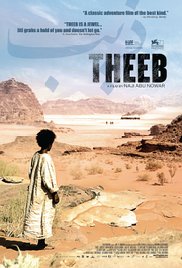
THEEB
Jordan/ United Arab Emirates/ Qatar, 2014, 100 minutes, Colour.
Jacir Eid Al- Hwietat, Hussain Salameh Al- Sweilhiyeen, Hussain Mutlad Al- Maraiyeh.
Directed by Naji Abu Nowar.
Theeb is the name of the young boy, member of a clan in the Arabian peninsular at the time of World War I – the period familiar to worldwide audiences from Lawrence of Arabia and also, very interestingly, in the story of Gertrude Bell, Queen of the Desert.
The film opens quite simply, two brothers in the desert, playing, getting water from a well, shooting practice. In the clan tent that the evening, two strangers are welcomed with the unquestioning Arab hospitality, a guide as well as an English soldier, both of them want to find a regiment as well as the railway line that is being laid through the desert.
Obviously, with the war, with the domination of the Ottoman Turks, there is an atmosphere of change, changes in tradition, the developments of the 19th and 20th centuries, especially the railway, making journeys so much shorter and efficient but also a threat to the traditions.
While the older brother is appointed a guide through the desert, Theeb follows on his donkey, and persuades his brother to take him on the journey, the soldier often wary, protecting his possessions which included a detonator.
One of the major hazards of travelling through the desert, apart from the desert terrain and the need for water, is the presence of brigands who then make themselves more than felt. While he is small and young, Theeb is a survivor, confronting one of the brigands, overwhelmed by the need for vengeance but covering it, complying with the brigand who wants to curry favour with the Turkish authorities.
Theeb acts surprisingly at the end and goes off into the desert, back to his clan and an uncertain future.
With its desert scenery, the film is impressive to look at. It also invites its audience into understanding some of the life of the Arab clans, the beauty of living in the desert, the hazards of living in the desert, and the colonial interventions of Western powers – and contemporary audiences realising the extraordinary consequences of the post-war creation of nations, carving up lands to create different boundaries and the subsequent power struggles and the modern Middle Eastern clashes.
1. A Jordanian story, international interest? The Arabian Peninsula? The local response? Universal?
2. The period, of Lawrence of Arabia, the Arabs, the tribes and bandits, the British, development of the railways? Costumes, decor, landscape photography?
3. The title, the focus on Theeb? The boy’s story, his perspective, lost and found?
4. The introduction and the tone, Hussain and Theeb, getting the water, watering the camels, playing, rifle practice, the bond between the brothers? Theeb and his age?
5. The family, the tribe, the tent, the gathering, the welcome to the guests, the meals, Theeb observing? Communal life, age and respect, the role of the men, the women? The British visitor, military, his curiosity? The box, the British man’s reaction to Theeb touching it? His sleep and nightmares?
6. The journey, quest, to find the regiment, to find the Railway? British influence? The tribes accepting? Questions about the railway and the transition to modes of travel through the desert, speed of travel? The journey, the camels, the landscapes? Theeb following on his donkey, letting the donkey go? Being accepted by his brother?
7. The landscapes, the risks, the bandits, the camp, the well with the body in it, the blood? The bandits shooting, the death of the guide, the military man killed?
8. Hussain and Theeb, going into the mountains, the shooting, hiding, their being surrounded, Hussain being shot? Theeb being chased, shot at, going down the well, the bandits cutting the rope?
9. Theeb getting out, surviving, managing, the brigand coming on the camel, his being wounded, Theeb getting the gun?
10. The wounded man, alive, wanting water, the bread, Theeb hungry? The guns? Getting the bullet out of the wound, cauterising the wound with a hot knife? Their being together? Some mutual dependence?
11. The travel, going to the Turkish headquarters? The brigand giving the information, the box with the detonator, the documents? His being paid? Saying that Theeb was his son, the coin, Theeb refusing the money?
12. Shooting the brigand, the reaction of the Turkish commander, sending Theeb away – and his future?